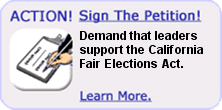Some Groups Go Easy on Obama for Opting Out
The decision by Barack Obama to opt out of public financing for his general election campaign - the first major-party presidential candidate to do so in the program's 32-year history - drew the expected criticism from organizations such as Public Citizen and Democracy 21, which favor public financing as a way to reduce the influence of special interest money in politics. But some other groups that have long lobbied for publicly funded elections have not censured the Illinois senator for his change of heart.
The president of Common Cause, for instance - Bob Edgar, a former House member from the Philadelphia suburbs - says his group "made a decision at the beginning of the election season not to criticize candidates for not participating in a flawed system."
The Public Campaign Action Fund sounded equally ambivalent in a statement it released shortly after his announcement two weeks ago. Obama's decision is "regrettable but understandable in light of the tens of millions of dollars that will be raised and spent outside the system attacking him," said the fund's David Donnelly and Nick Nyhart in a joint statement.
The Center for Responsive Politics and the Brennan Center for Justice, longtime advocates of changing the campaign finance system, took similar tacks.
All of the groups argue that Obama's decision may have been unavoidable because the current public financing system - which is ready to provide $84.1 million to the Republican candidate, Sen. John McCain of Arizona - isn't nearly generous enough, especially given the millions that outside advocacy groups are expected to pour into their own campaign ads this fall. (Obama might plausibly raise and spend in the range of $300 million.)
Might such responses show a hint of favoritism by such groups toward Obama, given the traditional alliance between campaign reform groups and Democrats on Capitol Hill? The groups say that's not the case.
A spokeswoman for Common Cause, Mary Boyle, points out that Edgar didn't criticize McCain when he opted out of the separate public financing system that governs the presidential primaries. And all the groups say they think Obama's decision to opt out gives him a special obligation to follow through on his pledge to push for public financing if elected.
That said, Boyle acknowledges that Obama's reformist credentials - she cites his cosponsorship of public financing legislation in the Senate and his refusal to accept contributions from lobbyists or political action committees - have earned him a bit more leeway than someone not so well credentialed might get. "We've gotten a little heat for" not condemning the Democrat's decision, she says. "But it's no reflection that Common Cause has lost interest in this issue or is not as serious about it."
However, the president of Public Citizen, Joan Claybrook, is less generous toward Obama: "It looks contradictory to say everyone else should do public funding but not me."
See the article on CQ Politics website
(In accordance with Title 17 U.S.C. Section 107, this material is distributed without profit to those who have expressed a prior interest in receiving the included information for research and educational purposes.)

